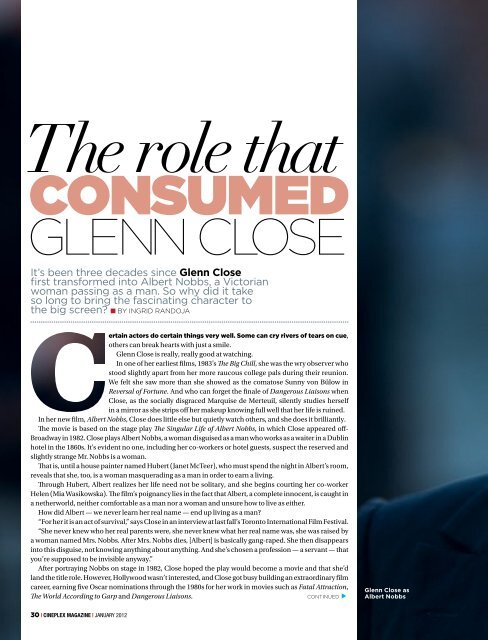Create successful ePaper yourself
Turn your PDF publications into a flip-book with our unique Google optimized e-Paper software.
The role that<br />
consumed<br />
Glenn Close<br />
It’s been three decades since Glenn Close<br />
first transformed into Albert Nobbs, a Victorian<br />
woman passing as a man. So why did it take<br />
so long to bring the fascinating character to<br />
the big screen? n By IngrId randoja<br />
ertain actors do certain things very well. Some can cry rivers of tears on cue,<br />
others can break hearts with just a smile.<br />
Glenn Close is really, really good at watching.<br />
In one of her earliest films, 1983’s The Big Chill, she was the wry observer who<br />
stood slightly apart from her more raucous college pals during their reunion.<br />
We felt she saw more than she showed as the comatose Sunny von Bülow in<br />
Reversal of Fortune. And who can forget the finale of Dangerous Liaisons when<br />
Close, as the socially disgraced Marquise de Merteuil, silently studies herself<br />
in a mirror as she strips off her makeup knowing full well that her life is ruined.<br />
In her new film, Albert Nobbs, Close does little else but quietly watch others, and she does it brilliantly.<br />
The movie is based on the stage play The Singular Life of Albert Nobbs, in which Close appeared off-<br />
Broadway in 1982. Close plays Albert Nobbs, a woman disguised as a man who works as a waiter in a Dublin<br />
hotel in the 1860s. It’s evident no one, including her co-workers or hotel guests, suspect the reserved and<br />
slightly strange Mr. Nobbs is a woman.<br />
That is, until a house painter named Hubert (Janet McTeer), who must spend the night in Albert’s room,<br />
reveals that she, too, is a woman masquerading as a man in order to earn a living.<br />
Through Hubert, Albert realizes her life need not be solitary, and she begins courting her co-worker<br />
Helen (Mia Wasikowska). The film’s poignancy lies in the fact that Albert, a complete innocent, is caught in<br />
a netherworld, neither comfortable as a man nor a woman and unsure how to live as either.<br />
How did Albert — we never learn her real name — end up living as a man?<br />
“For her it is an act of survival,” says Close in an interview at last fall’s Toronto International Film Festival.<br />
“She never knew who her real parents were, she never knew what her real name was, she was raised by<br />
a woman named Mrs. Nobbs. After Mrs. Nobbs dies, [Albert] is basically gang-raped. She then disappears<br />
into this disguise, not knowing anything about anything. And she’s chosen a profession — a servant — that<br />
you’re supposed to be invisible anyway.”<br />
After portraying Nobbs on stage in 1982, Close hoped the play would become a movie and that she’d<br />
land the title role. However, Hollywood wasn’t interested, and Close got busy building an extraordinary film<br />
career, earning five Oscar nominations through the 1980s for her work in movies such as Fatal Attraction,<br />
The World According to Garp and Dangerous Liaisons.<br />
ConTInUEd<br />
30 | <strong>Cineplex</strong> <strong>Magazine</strong> | january <strong>2012</strong><br />
Glenn Close as<br />
Albert Nobbs
















